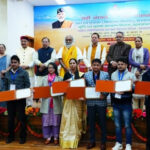Himalaya Harbinger, Rudrapur.
Three new varieties of Rabi pulses developed by Pantnagar University have been approved for cultivation by farmers across various regions of India. This decision was made at the Annual Meeting of the All India Rabi Pulses Project, held at the International Centre for Agricultural Research in Dry Areas, Sehore of Bhopal this week. The meeting was chaired by TR Sharma, Deputy Director General of the Indian Council of Agricultural Research (ICAR), who led the Varieties Release Committee.
This year, seven new varieties of Rabi pulses were approved for release by the committee, with three varieties—Pant Masoor-16, Pant Matar-509, and Pant Matar-517—developed by Pantnagar University in district Udham Singh Nagar. These varieties have been specially cultivated to adapt to different agro-climatic zones across the country.
Speaking on the achievement, AS Nain, Director of Research at Pantnagar University, said, “Our university is not only a leader in developing improved varieties of pulses but also a pioneer in producing breeder seeds of these varieties in sufficient quantities to meet demand.”
The newly released varieties have been recommended for specific regions to maximize yield. According to SK Verma, Project Coordinator, “Pant Masoor-16 is best suited for the northern hilly states such as Uttarakhand, Himachal Pradesh, Jammu & Kashmir, and hilly areas of West Bengal, Assam, and other northeastern states.” Meanwhile, Pant Matar-517 is recommended for the north-western states, including western Uttar Pradesh, the plains of Uttarakhand, Delhi, Punjab, Haryana, Rajasthan, and the Jammu division. Pant Matar-509 is advised for cultivation in the north-eastern states such as eastern Uttar Pradesh, Bihar, Jharkhand, Odisha, and West Bengal.
Manmohan Singh Chauhan, Vice-Chancellor of Pantnagar University, said, “ I congratulate the scientists and all the project personnel involved in the development of varieties which have been recognized for their potential to contribute to India’s agricultural progress. The university has developed over 70 varieties of pulses to date for various regions of India. With India aiming to become self-sufficient in pulse production by 2027, this will mark a significant step toward achieving this goal”.










